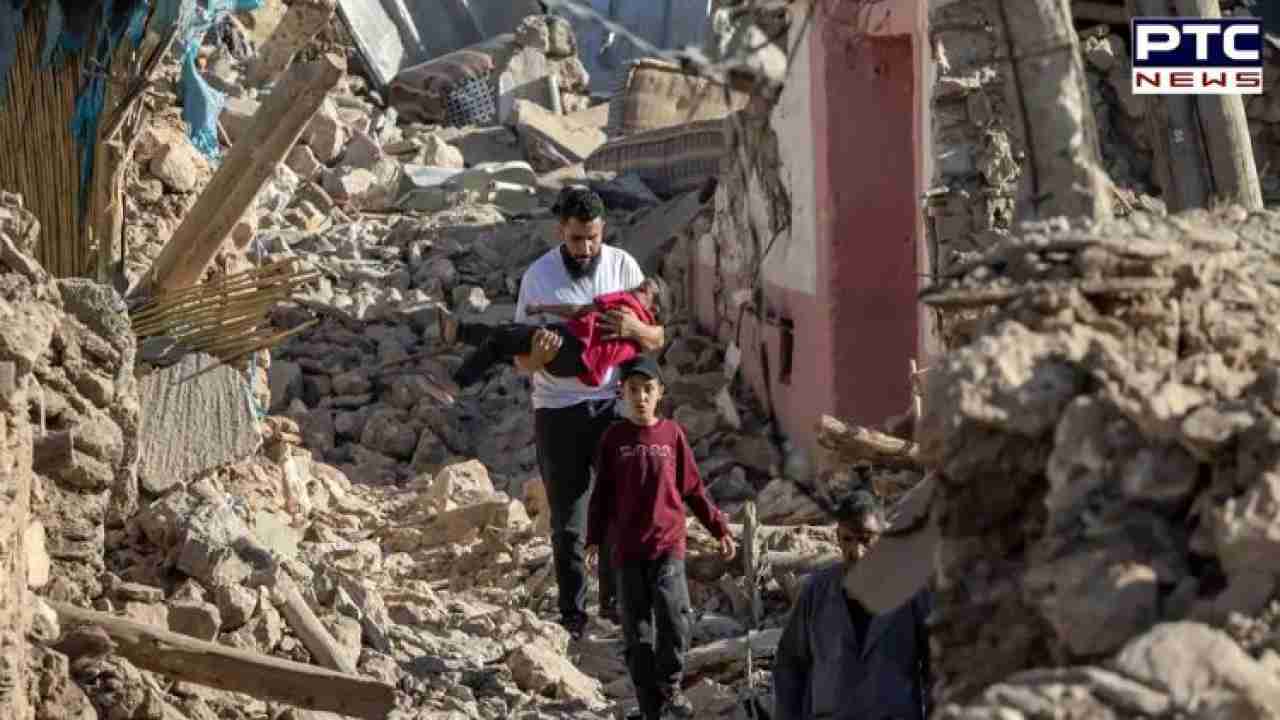
Morocco earthquake claims nearly 2,900 lives, leaves over 2,500 injured
Rabat, Morocco, September 12: Moroccan rescue teams, along with international assistance, are in a frantic race against time as they tirelessly work to rescue survivors from the rubble of mountain villages following the nation's most devastating earthquake on record. The powerful 6.8-magnitude quake struck the Atlas Mountains late Friday, southwest of the popular tourist destination, Marrakesh. Tragically, the latest official figures report at least 2,862 lives lost and over 2,500 individuals injured due to the catastrophe.
_a54806dcb5099892d755ca25f429453d_1280X720.webp)
In the severely affected village of Talat Nyacoub, an impressive display of emergency response efforts is underway. Twelve ambulances, numerous army and police 4x4s, and approximately 100 Moroccan rescuers are tirelessly searching for signs of life amidst the debris. Nearby, a Spanish team consisting of 30 firefighters, a doctor, nurse, and two technicians is collaborating with Moroccan authorities to initiate rescue operations, aided by a hovering helicopter.
Annika Coll, who leads the Spanish team, emphasizes the challenges faced in reaching remote and inaccessible areas. She notes that injured individuals are being airlifted to safety, highlighting the extraordinary efforts being undertaken to save lives.
Approximately 70 kilometers north of this scene, another Spanish team from the Military Emergencies Unit (UME) has established a base near Amizmiz village. Moroccan and Spanish rescue teams are working diligently to extract a family of five from a house that succumbed to the earthquake's force.
_1cf832454e1de7b25833b3df95c18f6c_1280X720.webp)
In Amizmiz, Moroccan troops have been distributing hundreds of blankets to residents who have lost their homes in the tragedy. Hafid Ait Lahcen, a 32-year-old construction worker, expresses the dire situation facing many survivors, saying, "My mother died, her house is ruined. My place in Amizmiz no longer exists so we sleep outside in tents with my two children aged four months and six years. No one from the authorities has offered us accommodation. We are completely lost."
In the rural commune of Ighil, located at the epicenter of the earthquake, helicopters have been making multiple trips to deliver much-needed aid. However, mudslides have blocked access to the village, leading some residents to embark on foot journeys in search of food for their families.
Albert Vasquez, the Spanish unit's communications officer, acknowledges the race against time, stating that "it's very difficult to find people alive after three days," but retains hope. To aid in their search, rescue teams are employing specially trained dogs and microcameras capable of penetrating the rubble to detect signs of life.
Tragically, for some, help came too late. An ambulance transported an 81-year-old man with a broken leg to the hospital while his family buried their mother, who lost her life in the earthquake. Habiba Barouj, one of the family members, recounts, "We didn't see any rescuers. We had to get our father out from the rubble ourselves. Our house has been swallowed up."
_ac755024ed717e2504ce4fe2c20011c9_1280X720.webp)
To bolster their efforts, Morocco has accepted offers of assistance from the United Kingdom, Qatar, the United Arab Emirates, and Spain, with the UK pledging to send 60 personnel along with search dogs and rescue equipment.
The earthquake's devastation has been particularly severe in remote mountain villages where many houses were constructed from mud bricks. As international aid teams continue to arrive, Moroccan authorities are setting up emergency shelters, and the landscape is dotted with bright yellow tents. Tikht, a village that once housed over 100 families, now lies in ruins, with the remaining residents receiving aid and support from civil protection services.
Despite the extensive destruction and loss of life, the Moroccan spirit of solidarity remains strong. Citizens have been donating blood for the injured, including members of Morocco's national football team and renowned French-Moroccan comic Jamel Debbouze. Volunteers are also organizing food and essential goods to aid earthquake victims, highlighting the importance of collective efforts in times of crisis.
Prime Minister Aziz Akhannouch has assured citizens that those who have lost their homes will receive compensation, although specific details are still being determined.
In addition to the impact on remote villages, the earthquake caused significant damage to parts of Marrakesh's historic medina and its network of narrow alleyways, a UNESCO World Heritage site. As the recovery efforts continue, dozens of people are still forced to sleep outdoors in the modern quarter of Marrakesh.
The United Nations Human Rights Council in Geneva opened its session with a minute of silence in honor of the quake victims, underscoring the global solidarity in times of adversity.
This earthquake stands as the deadliest to strike Morocco since the 1960 Agadir earthquake, which claimed the lives of 12,000-15,000 people.
Also Read: Libya Floods: Over 2,000 feared dead, thousands missing after devastating deluge in Derna
- With inputs from agencies
